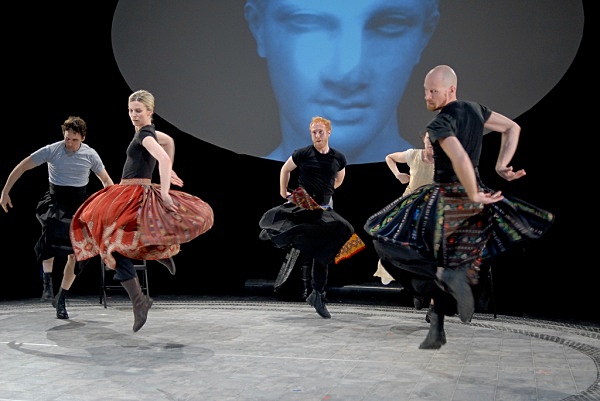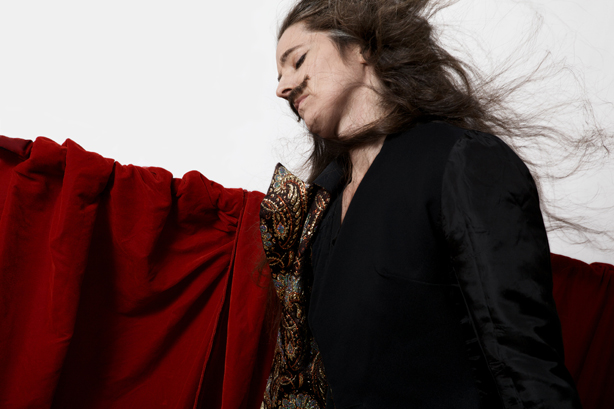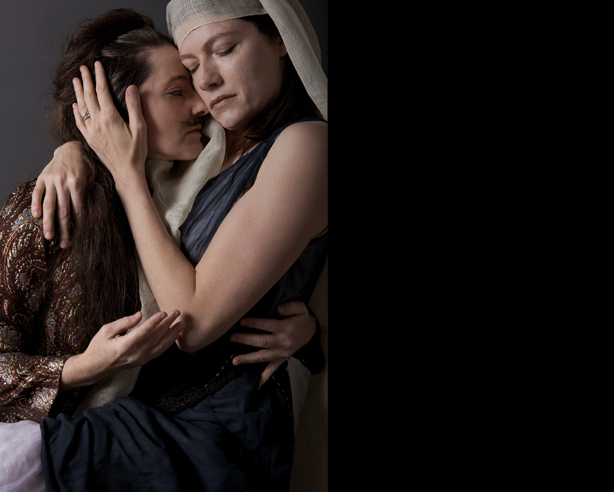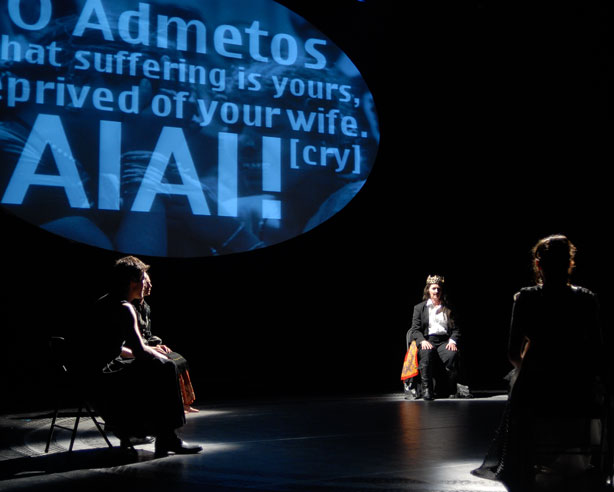Greek Lessons
Lightsey Darst grapples with the innovative theatrical hybrid, "Supernatural Wife" by Big Dance Theater, recently at the Walker, a piece adapted from poet Anne Carson's fresh translation of a rarely performed play by Euripedes, "Alkestis".




IT’S TAKEN ME A LONG TIME TO FIGURE OUT WHAT TO SAY about Big Dance Theater’s Supernatural Wife (based on Anne Carson‘s translation of Euripides’s Alkestis), a new commission recently on stage at the Walker. The show’s well-crafted, fast-paced, hipper than we knew we could be and yet never difficult to follow — in short, so deafeningly contemporary it’s hard to see ’round it. But I think I can make something of it, nonetheless, and thus,
What we learn about ourselves, and about what’s going on in performance, from Big Dance Theater‘s Supernatural Wife:
1. Naturalistic acting is so last year.
Naturalistic acting has been so last year lo these many years, but Supernatural Wife pounds in the coffin nails with special glee. Hardly anyone acts here, and no one emotes. Some characters, like Aaron Mattocks’s excellent Death, are all trait and attitude, dry breathy voice and alluring catlike grace; others, like Pete Simpson’s brawny Herakles, who enters pounding a drum set and speaks his opening lines lofting a cymbal as barbell, are mere cartoons. The grieving husband Admetos might seem called on to make actual faces, but instead he launches into a stylized mask of woe every so often, accompanied by an animal sound effect, a crow-like “Ai!” Or rather, he would do this if he were a he, for the king here is played in wink-wink drag by Molly Hickok, thus setting the actual face of grief at a double remove (on which distance, more in a minute).
I can’t but be happy about this apparent death of so-called naturalism: I’ve declaimed my general lack of respect for acting, which I like to call “actoring,” at many a cocktail party, and it’s nice to feel the zeitgeist is with me on this. Because really, what’s the sense in actors pretending to be ordinary people when they so obviously are on stage, and pretending at “real life” in such fakey ways at that — the sudden hush, the sly turn, all those actorly tricks that signify reality without at all resembling it.
But as soon as I remember that the “reality” of naturalistic acting is conjured through various un-lifelike tricks, I find myself worrying this might be a “the king is dead, long live the king” sort of situation. Will we eventually find the new tricks corny and manipulative, too, and then perhaps be relieved by the softer face of naturalism?
2. The new performer is more than a triple threat, and the new performance is more than dance theater.
If I provided you with a list of everything that’s done in Supernatural Wife, every register that’s evoked, I’d be missing the point. Sure, Supernatural Wife combines speech, dance, choral singing, sets, silent film, projection, etc., and sure Tymberly Canale (to take one example) can talk, dance, perform circus tricks, and sing, but it’s gauche to gawk at what’s now considered in the field to be merely competence. The flair now is in the details and subgenres: in Canale’s ratatat delivery and her genuinely interesting feet, or in the opening scene in which heavy metal music meets ancient Greek footwork meets avant-garde precision gesture meets Jeff Larson’s enormous projection of a suggestively muddled Apollo meets Oana Botez-Ban’s stunning black-and-bright full-skirts-and-tight-shirts costumes, like a folkdance from our future.
3. Speaking of folk and future, the classics are new again.
When I was in college, the classics grad students were a contentedly geeky bunch. They were up to their ears in Ovid and writing dissertations on various questionable Roman customs, but they couldn’t translate worth a damn and were already happily married to each other, pleasantly contemplating spending their lives munching away at minutiae. These days, I imagine their counterparts to be lean and hungry and lusty, like A. S. Byatt or Roberto Bolaño’s unlikely literary critics, because their field is now hot.
I’m no expert on the state of the classics (though I will admit to being a two-time national myth champ), but I see an overall shift from “the glory that was Greece and the grandeur that was Rome,” from that stately past of heroism and achievement whose writings must be held sacred and rendered only in high-flown language. Now, we feel the kinship of crumbling empires, and we understand the Greeks and Romans as people like us (or like a certain version of us — on which, more in a second) — confused, bitter, sexy, doomed, raw.
Poet Anne Carson is at least partly responsible for the change. Contemporary references and razor lines make her translations of these ancient texts bracing, a challenge to be more immediate. Which leads to my last point …
4. We like to think we are white-hot.
Perhaps naturalistic acting is gone because we believe our emotional nature has changed: we fancy ourselves unsentimental yet passionate, beautiful glaciers but burning at the core. Again, I’d invoke Carson: the mood of her work is that which the smart set aspires to.
But are we really as fiery-cold as we like to think? Although casting a woman in the role of Admetos adds initial frisson, by the end of the play, this decision actually simplifies what could be an unhinging moment. When Herakles brings Alkestis back from the dead (or brings back someone who seems to be Alkestis: she’s veiled and can’t speak), he offers her as a prize to the grieving Admetos, who, mindful of the promise he’s made to Alkestis not to marry again, refuses to take her. Herakles insists; Admetos sees how the strange woman’s form is like his wife’s; eventually Herakles forces Admetos to accept her, and only then does he unveil Alkestis. Having a woman play Admetos cuts through the scene’s uneasy sexual implications.
Neither so cold then, nor perhaps so fiery: I wanted to feel more, but my sluggish system often responded only with an idea of feeling, as in This is what I would like to feel now. But I don’t mean to say that I or we can’t or won’t ever get to that state of icy-hot passion Carson makes so appealing. We seem to want it; maybe that’s what’s interesting.
________________________________________________________
Noted performance details:
Big Dance Theater’s Supernatural Wife, was on stage at the Walker Art Center, which commissioned the piece, on November 17-19, 2011.
______________________________________________________
About the author: Originally from Tallahassee, Lightsey Darst is a poet, dance writer, and adjunct instructor at various Twin Cities colleges. Her manuscript Find the Girl was recently published by Coffee House; she has also been awarded a 2007 NEA Fellowship. She hosts the writing salon, “The Works.”